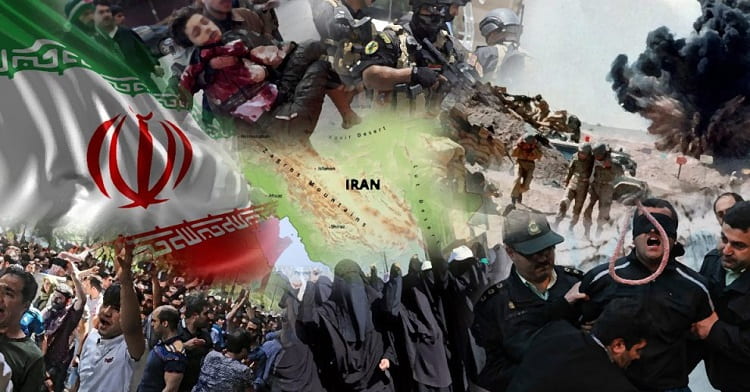Author: Farzin Vajihi
Recent Iran’s uprising and suppression and violation of human rights by the Islamic Republic government have sparked protests in the country. Protesters are responding to human rights abuses in the Islamic State of Iran. It is saddening to hear the stories of the repressive government that, to the least, denies its people fundamental human rights to freedom of expression, worship, and life. As things stand, Iran’s uprising, suppression, and violation of human rights by the Islamic Republic government are at their peak. The voices of the people are silenced by a regime that has little regard for the meaning of democracy and human rights.
Mahsa protests are one of the recent events that have sparked debate over the human rights situation in the country. Mahsa, a young girl, met her untimely death at the hands of the “morality police” for a petty offence of not putting on a proper hijab. Why should the police terminate the life of such a young girl on the grounds of dressing? Mahsa’s death was an iceberg of a deeper issue bedevilling Iranian society: human rights violations and abuse. The Iranian Islamic government is a repressive regime responsible for gross violations of the human rights of thousands of its people. From the basic rights of women over their bodies to the right to life, the repressive government has spared no one.
The Iranian Islamic dictatorial regime has abused the legislature and judiciary to the peril of Iran’s people. Each day, numerous human rights violations occur in the country, adversely affecting the quality of life of innocent citizens. Firstly, Iranian authorities continue publicly violating the right to peaceful assembly and expression. In the recent past, Excessive force has been lashed at protesters, leading to serious injuries and deaths. The regime silences alternative voices against the government. Many sources reported that almost 20000 people were arrested in the past months connected to the Woman-Life-Freedom movements and many of them are still in the prison and sentenced to many years in unfair trials by corrupt judges. More than 500 people were killed by Islamic Regime authorities. Among them, we can mention Sarina Esmailzadeh, Nika Shahkarami, and Kian Prifalak who were still kids.
The right to life in Iran is in danger. Current statistics identify Iran as one of the leading implementers of capital punishment. Capital punishment fails to dignify human life and guarantee the right to life. According to Human Rights Watch, Iran had executed an estimated 500 people in the past year that two times more than last year. Mohammad Reza Rahnavard, Mohsen Shekari, Seyed Mohammad Hosseini, and Mohammad Mehdi Karami, were executed related to the recent uprising in Iran. Some of these individuals are executed due to the vague national security crime laws. For instance, Moharebeh was executed because of “enmity against God.” The high number of executions reveals little regard for the right to life. Still, 20 people who were arrested in the recent movement are in danger of execution.
Inhumane treatment is rampant in Iran. The regime has created vague laws that criminalize gay relations, alcohol drinking, apostasy, and adultery. Inhumane treatment is also executed by flogging individuals committing more than 100 offenses. Offenses such as protesting to disrupt public order have equally attracted flogging. Petty offenses such as drinking could attract inhumane treatment and lashes. For instance, Iran Human Rights reported an incident where a man was executed after being convicted of repeatedly being drunk.
Human rights advocates have not been spared either. In the last two or so years, several lawyers and human rights activists have been prosecuted, including Amirsalar Davoudi, and Mohammad Najafi, for participating in political activism. Iranian authorities have not spared human rights advocates, for they are treated as the enemy of the state.
The rogue justice system in Iran concerns the international community. In Iran, the use of confessions from individuals under torture as witness evidence is rampant. Authorities have failed to follow up with cases involving the torture of victims at the hands of the police. The regime has further constrained detainees from accessing legal counsel during investigations. These initiatives minimize the chances of a free trial of accused persons.
It would not be prudent to wind up this article without highlighting the perils of the minorities in Iran. The government violates the rights of minorities in many ways. For instance, members of the Baha’i faith are arrested and punished on national security charges. The regime is also involved in suspending their business licenses. They are also denied equal opportunity to enroll in public universities. It is punishable for this community to host private house churches or contact missionaries abroad.
As things stand, the world should not only marvel at the progress made in protecting human rights in the West at the expense of the pain and suffering of Iranians who did not choose to be Iranians but were born there.
The state of human rights in the country is wanting!
You may also like
-
Mexico's president downplays cartel violence that drove nearly 600 Mexicans into Guatemala
-
How to Get a Digital Nomad Visa in Thailand: Global Mobility Institute
-
Pentagon chief calls Vice President Kamala Harris 'key player' on national security issues
-
Real-life cocaine sharks: Scientists say sharks off the coast of Rio de Janeiro testing positive
-
A Cockney Rosebud: New Bittersweet and Poignant Memoir Captivates with Tale of Early 20th Century East End Family Life

